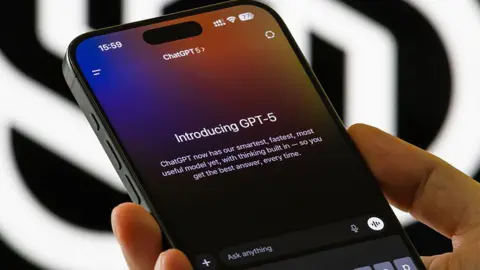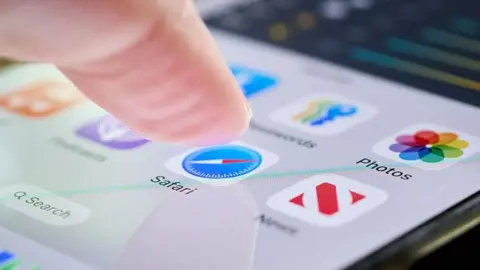Suzanne BearneTechnology Reporter
 Anja-Sara Lahady
Anja-Sara LahadyLike most people, when Anja-Sara Lahady used to check or research anything online, she would always turn to Google.
But since the rise of AI, the lawyer and legal technology consultant says her preferences have changed – she now turns to large language models (LLMs) such as OpenAI’s ChatGPT.
“For example, I’ll ask it how I should decorate my room, or what outfit I should wear,” says Ms Lahady, who lives in Montreal, Canada.
“Or, I have three things in the fridge, what should I make? I don’t want to spend 30 minutes thinking about these admin tasks. These aren’t my expertise; they make me more fatigued.”
Ms Lahady says her usage of LLMs overtook Google Search in the past year when they became more powerful for what she needed.
“I’ve always been an early adopter… and in the past year have started using ChatGPT for just about everything. It’s become a second assistant.”
While she says she won’t use LLMs for legal tasks – “anything that needs legal reasoning” – she uses it in a professional capacity for any work that she describes as “low risk”, for example, drafting an email.
“I also use it to help write code or find the best accounting software for my business.”
Ms Lahady is not alone. A growing number are heading straight for LLMs, such as ChatGPT, for recommendations and to answer everyday questions.
ChatGPT attracts more than 800 million weekly active users, up from 400 million in February 2025, according to Demandsage, a data and research firm.
Traditional search engines like Google and Microsoft’s Bing still dominate the market for search. But LLMs are growing fast.
According to research firm Datos, in July 5.99% of search on desktop browsers went to LLMs, that’s more than double the figure from a year earlier.
 Getty Images
Getty ImagesProfessor Feng Li, associate dean for research and innovation at Bayes Business School in London, says people are using LLMs because they lower the “cognitive load” – the amount of mental effort required to process and act on information – compared to search.
“Instead of juggling 10 links with search, you get a brief synthesis that you can edit and iterate in plain English,” he says. “LLMs are particularly useful for summarising long documents, first-pass drafting, coding snippets, and ‘what-if’ exploration.”
However, he says outputs still require verification before use, as hallucinations and factual errors remain common.
While the use of AI might have exploded, Google denies that it is at the expense of its search engine.
It says overall queries and commercial queries continued to grow year-over-year and its new AI tools significantly contributed to this increase in usage.
Those new tools include AI Mode, which allows users to ask more conversational questions and receive more tailored responses in return.
That followed the rollout of AI Overviews, which produces summaries of queries at the top of the search page.
While Google plays down the impact of LLMs on its search business, an indication of the affect came in May during testimony in an antitrust trial bought by the US Department of Justice against Google.
A top Apple executive said that the number of Google searches on Apple devices, via its browser Safari, fell for the first time in more than 20 years.
Nevertheless, Prof Li doesn’t believe there will be a replacement of search but a hybrid model will exist.
“LLM usage is growing, but so far it remains a minority behaviour compared with traditional search. It is likely to continue to grow but stabilise somewhere, when people primarily use LLMs for some tasks and search for others such as transactions like shopping and making bookings, and verification purposes.”
 Getty Images
Getty ImagesAs a result of the rise of LLMs, companies are having to change their marketing strategies.
They need to understand “which sources the model considers authoritative within their category,” says Leila Seith Hassan, chief data officer at digital marketing agency Digitas UK.
“For example, in UK beauty we saw news outlets and review sites like Vogue and Sephora referenced heavily, whereas in the US there was more emphasis on content from brands’ own websites.”
She says that LLMs place more trust in official websites, press releases, established media, and recognised industry rankings than in social media posts.
And that could be important, as Ms Seith Hassan says there are signs that people who have used AI to search for a product, are more likely to buy.
“Referrals coming directly from LLMs often appear to be higher quality, with people are more likely to convert to sales.”
There is plenty of anecdotal evidence that people are turning to LLMs when searching for products.
Hannah Cooke, head of client strategy at media and influencer agency Charlie Oscar, says she started using LLMs in a “more serious and strategic way” about 18 months ago.
She mainly uses ChatGPT but has experimented with Google Gemini to personally and professionally streamline her work and life.
Ms Cooke, who lives in London, says rather than turning to Google, she will ask ChatGPT for personalised skincare recommendations for her skin type. “There’s fewer websites I need to go through,” she says of the benefits.
And it’s the same with travel planning.
“ChatGPT is much easier to find answers and recommendations,” she says.
“For example, I used ChatGPT to research ahead of a recent visit to Japan. I asked it to plan two weeks travelling and find me restaurants with vegetarian dishes. It saved [me] hours of research.”

